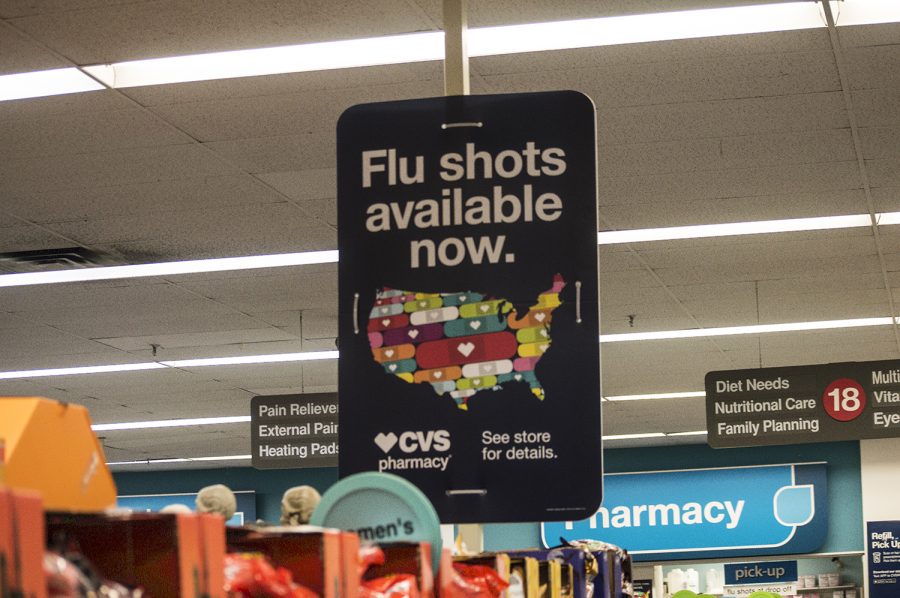2018 flu season expected to be mild compared to previous years
The upcoming flu season is expected to be more mild than last year’s, but local health professionals still encourage Iowa City residents to vaccinate.
CVS Pharmacy advertises flu shots on Sept. 24, 2018.
September 25, 2018
The upcoming 2018 flu season is projected to hit Iowa City this October, and local health professionals are preparing with vaccinations, medications, and more.
Due to the unpredictability of the Influenza infection, its severity in North America is estimated based on the Southern Hemisphere’s recent flu season, UI Hospital and Clinics Hospital Epidemiologist Jorge Salinas said. He said this year could be a very mild flu season.
“This year, the flu season in Australia was type H1N1,” Salinas said. “We’re hoping to have that same type here, which would mean a milder season.”
RELATED: Iowa hospitals aim to better prepare for the next flu season
Such a mild flu season would be a definite contrast to the 2017 influenza epidemic, which saw a sharp increase in flu patients and the severity of the illness.
“In the U.S. last year, we saw type H3N2,” Salinas said. “Historically, our vaccines have been less effective against this type, and it is typically more severe.”
However, the influenza vaccine is proven to be more effective against the influenza type H1N1, which Salinas predicts can be expected.
“I cannot promise that this will be the case, but it’s a possibility,” Salinas said. “One thing people can do, is always get a flu vaccine. This is the time to start thinking about that.”
Salinas emphasized the number of resources available to UI students, including Urgent Care, Quick Care, and the new UIHC E-Care, which allows patients to speak to a doctor electronically.
Health specialists stress the importance of seeking the vaccine early on, which takes two weeks to build up the proper protection against influenza. Other methods of flu prevention include washing one’s hands, staying home when sick, and covering one’s cough.
“It’s really old-fashioned,” Johnson County Public Health Clinical Services Manager Kate Klefstad said. “But there are simple ways to prevent the spread of Influenza. We’re just trying to keep it contained and all kinds of common sense are effective.”
The Public Health Department provided statistics that show 80 percent of children in Iowa who died from Influenza in 2017 were unvaccinated.
“Many people don’t realize that we’re just now concluding the 2017 flu season,” Klefstad said. “Children younger than six months can’t be vaccinated, so it’s a matter of protecting the people that surround them.”
In response to the misconception that the flu vaccine actually makes people more susceptible to influenza, Klefstad insisted the vaccine is the number one defense against the illness.
“There’s no data to support that myth,” Klefstad said. “There’s a lot of research that goes into how to develop the vaccine each year. It’s definitely a science of predicting and developing a vaccine that’s protective against different strains of the flu.”
Very few cases of the flu are evident before December, and the illness usually peaks in January and February.
Last year’s vaccine was estimated at 40 percent effective, which Mercy Hospital Infectious Disease Specialist David Kusner said is low. The average goal for health professionals is to see a 65 to 70 percent rate of effectiveness for vaccines.
“It’s important to understand that influenza has ups and downs and surprises,” Kusner said. “We place emphasis on the sickest people, try to work to their benefit, and try to get them the best protection we can.”





















